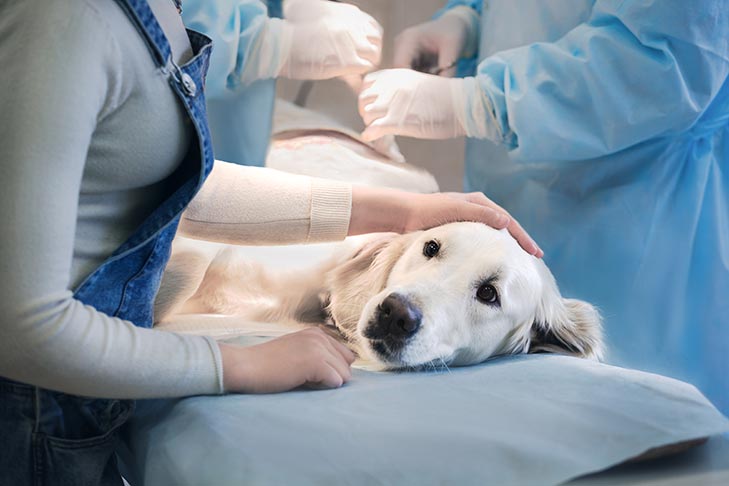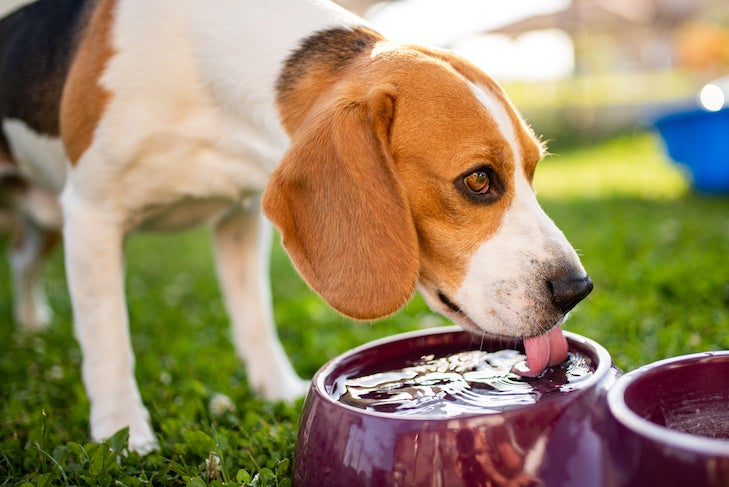
Although hyperthyroidism in dogs is a relatively rare disease, it can have serious consequences for a dog’s health and life expectancy. The function of the thyroid gland is to produce hormones that regulate metabolism or, in other words, how quickly the body uses energy. Hyperthyroidism occurs when the thyroid gland releases more hormones than what are necessary for the body to function.
The most common cause of hyperthyroidism in dogs is a tumor in the thyroid gland, located near the dog’s windpipe. Since these tumors are often cancerous, it’s important to be aware of hyperthyroidism symptoms in dogs. Here’s what you need to know about this condition, including the causes, symptoms, prevention, and treatment.
What Is Hyperthyroidism in Dogs?
The thyroid is a small, butterfly-shaped organ in the middle of the neck with one lobe on each side of the trachea, says Dr. Jerry Klein, DVM, Chief Veterinary Officer for the American Kennel Club. As one of the major endocrine glands in the body, the thyroid produces or secretes hormones that regulate metabolism. “Thyroxine or T4 is the main hormone produced by the thyroid,” he adds. This hormone plays an important role in the functioning of the muscles and heart, as well as in brain development.
Hyperthyroidism in dogs is “the result of an overactive thyroid gland,” says Dr. Kelly Fishman, DVM, founder of Strut Animal Mobility Specialists and veterinary consultant to MYOS Pet. When this happens, the overproduction of hormones fuels the breakdown of fat and muscle. “This increased metabolic rate has detrimental effects on the body’s organs and leads to a poor quality of life,” she adds.

It’s not uncommon for dogs to experience thyroid problems. “By far the more common thyroid issue is low production of thyroxine, or hypothyroidism,” Dr. Klein says. Compared to dogs, cats are more likely to develop hyperthyroidism. In fact, 10% of cats nine years and older have hyperthyroidism, Dr. Fishman says.
What Are the Symptoms of Hyperthyroidism in Dogs?
Dogs with hyperthyroidism show symptoms that are consistent with an increase in metabolism. Dr. Fishman explains that these symptoms can range from mild to severe, depending on how long the hyperthyroidism has been untreated and how elevated the thyroid hormones are. Symptoms include:
- Weight loss
- Increased thirst
- Increased appetite
- Increased urination
- Hyperactivity (e.g., pacing, restlessness, vocalizing)
- Increased heart rate and blood pressure
- Heart arrhythmias
- Periodic vomiting after eating
- Periodic diarrhea
- Enlargement of the thyroid gland found by palpating the neck
Since weight loss is a common symptom, she recommends weighing your dog monthly. Your dog might not be visibly thinner, but the lower number on the scale could be an early warning sign of hyperthyroidism. Plus, weighing your dog is “a great screening tool because it can be done at home and without any costs,” she adds.

Increased thirst and appetite are also common with hyperthyroidism. As the body is using more energy, it burn stores of fat and promotes muscle loss, she says. Your dog might beg for food or steal human food to keep up with these energy demands.
What Causes Hyperthyroidism in Dogs?
In many cases, hyperthyroidism in dogs is caused by a tumor in the thyroid gland which is “primarily cancerous as opposed to benign,” Dr. Klein says. “The other most common cause of hyperthyroidism in dogs is prolonged overdosing of a hypothyroid dog on its medication.” A tumor is said to be benign when it grows slowly and hasn’t spread to other parts of the body.
Benign tumors don’t usually cause problems unless they grow to a size where they’re compressing the dog’s trachea and causing breathing difficulties. Surgery is usually effective in removing most benign tumors, and they tend not to recur. Others can develop into cancerous or malignant tumors. Cancerous tumors often spread to nearby or more distant structures (e.g., the lungs, brain, and liver) or what’s referred to as metastasis. These tumors require careful monitoring and, if diagnosed early, can be treated with a combination of surgery and radiation or chemotherapy.
Since the condition was first observed, cases of hyperthyroidism have increased and “this has partly been attributed to improved screening,” Dr. Fishman notes. Other contributing factors include an increased risk of cancer with age and prolonged exposure to environmental risk factors including chemicals in processed food. As with cats, “most dogs develop thyroid cancer at an older age, usually nine years of age or older,” Dr. Klein says. Some dog breeds also have an increased risk of developing thyroid cancer, such as the Siberian Husky, Golden Retriever, and Beagle, he adds.
How Is Hyperthyroidism in Dogs Diagnosed?
Diagnosing hyperthyroidism can be challenging since some physical changes are part of the normal aging process. For example, seeing your dog losing weight or muscle tone may not set off any alarm bells that your dog has a thyroid issue. Plus, you wouldn’t necessarily think something is wrong if your dog is eating normally or has an increased appetite.
If you have concerns about your dog’s weight loss, or you notice a lump on their neck, schedule an appointment with your vet. “Diagnosing hyperthyroidism involves a thorough physical examination with appropriate history from the owner and blood work to check all body function,” Dr. Klein says. The vet will palpate your dog’s neck to see if the thyroid gland is enlarged. If the dog has a lump, they may have “difficulty swallowing, coughing, or breathing due to pressure on the neighboring trachea,” he adds.

Blood tests may show increased levels of T4. “If the T4 levels are normal, but hyperthyroidism is still suspected, additional tests can be performed, such as a T3 suppression test,” he says. This involves taking a baseline sample, administering a drug, and retesting the blood to see if the T4 level is outside the normal range.
If your vet suspects that a thyroid tumor is present, “testing to see if there has been metastatic spread should be performed such as chest radiograph and abdominal ultrasound,” Dr. Klein says. They may also recommend advanced imaging, such as CT scans, to evaluate the exact size of the tumor and whether it’s invading any important neighboring structures such as the carotid artery, he adds.
Because symptoms of hyperthyroidism may go unrecognized, it’s important to “keep up with yearly or twice-yearly wellness exams with your veterinarian,” Dr. Fishman says. When hyperthyroidism is mild or caught early, lab tests may not show elevated thyroid hormone levels initially. If your dog is showing symptoms of hyperthyroidism, your vet may recommend additional testing and a return visit with re-testing of thyroid levels at a later date, she adds.
How is Hyperthyroidism in Dogs Treated?
Most dogs with hyperthyroidism have a tumor, so treatment generally involves “surgery to remove the tumor or one or both thyroid gland lobes,” Dr. Klein explains. After removing the thyroid gland, your dog will no longer produce hormones, so they will need to be on medication for hypothyroidism, he adds. A benefit of surgery is that it can lead to a moderate to high cure rate, particularly if both globes are removed. The downsides are the cost of surgery, risk of anesthesia, and potential for regrowth of the gland, Dr. Fishman explains.
Another risk of surgery concerns the small glands next to the thyroid called the parathyroid gland which controls the level of calcium in the blood. “Thyroid surgery may damage these glands or result in their removal (called hypoparathyroidism), so calcium medication may be needed after surgery,” he adds. Because this is a delicate procedure, the vet may refer your dog to a surgeon with specialized training.
Aside from surgery, radioactive iodine therapy is performed in cats and involves a single injection of radioiodine to kills abnormal thyroid cells, Dr. Fishman says. Despite having a high cure rate (95 to 99%) with low side effects, this treatment can be expensive and requires special licensing, so it may not be available in your area. In addition, radioactive iodine therapy is not commonly performed in dogs, Dr. Klein explains. A recent study suggested that radioactive therapy could be used for tumors which can’t be removed surgically, but it was based on a small sample size.

Other proposed treatments for dogs include medications and prescription diets to control hyperthyroidism, “but they are not as commonly prescribed,” he adds. These include diets that are low in iodine because “thyroid hormones need iodine from the food to be made,” Dr. Fishman says. Keep in mind that medications and prescription diets do not stop the tumor from growing.
In cases where a dog becomes hyperthyroid because of a medication overdose, the vet will likely change the prescribed dose and continue to monitor the dog closely for the next four to six months including blood work. Medications tend to be more readily available, but they can have side effects and be costly in the long-term with frequent vet visits to monitor thyroid disease, Dr. Fishman adds.
What Is the Prognosis for a Dog with Hyperthyroidism?
From a prevention standpoint, if a tumor causes the condition, there’s little that can be done to prevent the development of thyroid tumors. That said, “many dogs with thyroid cancer do fairly well with surgery if the cancer hasn’t spread to other areas,” Dr. Klein says. “Average survival times after recovery from successful surgery is roughly three years.” The prognosis is grim if the cancer has spread.
Among dogs who become hyperthyroid as a result of a medication overdose, “adjustment of medication dosage and frequent rechecks, as well as giving medication exactly as prescribed will help prevent additional overdoses,” he says. From diagnosis to surgery and aftercare, treatment for hyperthyroidism can become quite expensive. Your vet will consider your dog’s age and overall health when recommending a treatment plan, Dr. Fishman adds.
This article is intended solely as general guidance, and does not constitute health or other professional advice. Individual situations and applicable laws vary by jurisdiction, and you are encouraged to obtain appropriate advice from qualified professionals in the applicable jurisdictions. We make no representations or warranties concerning any course of action taken by any person following or otherwise using the information offered or provided in this article, including any such information associated with and provided in connection with third-party products, and we will not be liable for any direct, indirect, consequential, special, exemplary or other damages that may result, including but not limited to economic loss, injury, illness or death.

